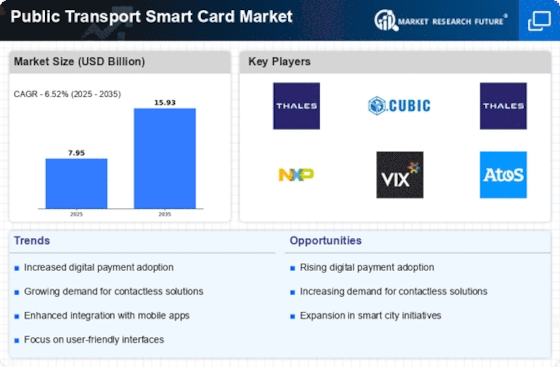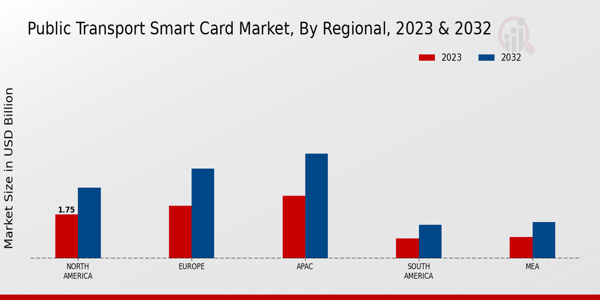Growing Urbanization
Urbanization is a significant driver of the Global Public Transport Smart Card Market Industry. As more people migrate to urban areas, the demand for efficient public transport systems increases. This trend is evident in cities like New Delhi and Sao Paulo, where smart card systems have been introduced to manage the rising passenger volumes. The convenience of smart cards encourages more individuals to utilize public transport, thereby reducing traffic congestion and pollution. With urban populations expected to rise, the market is projected to grow from 7.95 USD Billion in 2024 to 15.9 USD Billion by 2035, indicating a robust demand for smart card solutions.
Government Initiatives
Government initiatives aimed at promoting public transport are significantly influencing the Global Public Transport Smart Card Market Industry. Many governments are investing in smart card technology to enhance public transport systems and encourage sustainable travel. For example, the European Union has launched various funding programs to support the implementation of smart card systems across member states. These initiatives not only improve the efficiency of public transport but also promote environmental sustainability. As governments continue to prioritize public transport, the market is likely to benefit from increased funding and support, driving growth in the coming years.
Market Growth Projections
The Global Public Transport Smart Card Market Industry is poised for substantial growth, with projections indicating an increase from 7.95 USD Billion in 2024 to 15.9 USD Billion by 2035. This growth trajectory suggests a compound annual growth rate of 6.52% during the period from 2025 to 2035. Factors such as technological advancements, urbanization, and government initiatives are expected to contribute to this expansion. The market's potential is further underscored by the increasing adoption of smart card systems across various regions, reflecting a global trend towards more efficient and user-friendly public transport solutions.
Technological Advancements
The Global Public Transport Smart Card Market Industry is experiencing rapid technological advancements that enhance the efficiency and user experience of smart cards. Innovations such as contactless payment systems and mobile integration are becoming increasingly prevalent. For instance, cities like Singapore and London have successfully implemented smart card systems that allow seamless travel across multiple modes of transport. These advancements not only streamline operations but also attract more users, contributing to the market's projected growth. As the industry evolves, the integration of advanced technologies is likely to play a pivotal role in shaping the future of public transport.
Increased Focus on Contactless Payments
The shift towards contactless payments is a crucial factor driving the Global Public Transport Smart Card Market Industry. With the growing preference for cashless transactions, smart cards offer a convenient and secure payment method for commuters. This trend is particularly evident in regions like North America and Europe, where contactless smart cards are widely adopted. The convenience of tap-and-go technology enhances the user experience, encouraging more individuals to utilize public transport. As the market evolves, the integration of contactless payment solutions is expected to contribute to a compound annual growth rate of 6.52% from 2025 to 2035, reflecting the increasing demand for efficient payment systems.
Environmental Sustainability Initiatives
The Global Public Transport Smart Card Market Industry is also driven by the growing emphasis on environmental sustainability. As cities strive to reduce carbon emissions and promote greener transport options, smart card systems play a vital role in facilitating the use of public transport. Initiatives aimed at reducing reliance on personal vehicles are gaining traction, particularly in urban areas. For instance, cities like Amsterdam have implemented smart card systems to encourage public transport usage, thereby contributing to lower emissions. This focus on sustainability is likely to propel the market forward, as more cities adopt smart card technology to support their environmental goals.












